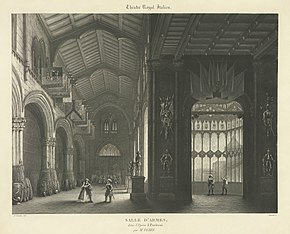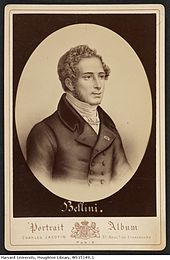| I puritani | |
|---|---|
| Opera by Vincenzo Bellini | |
 The Hall of Arms (act 1, scene 3) in the original 1835 production | |
| Librettist | Carlo Pepoli |
| Language | Italian |
| Based on | Têtes Rondes et Cavalieres by Jacques-François Ancelot and Joseph Xavier Saintine |
| Premiere | 24 January 1835 Théâtre-Italien, Paris |

I puritani (The Puritans) is an 1835 opera by Vincenzo Bellini. It was originally written in two acts and later changed to three acts on the advice of Gioachino Rossini, with whom the young composer had become friends.[1] The music was set to a libretto by Count Carlo Pepoli, an Italian émigré poet whom Bellini had met at a salon run by the exile Princess Belgiojoso, which became a meeting place for many Italian revolutionaries. The opera is based on Têtes Rondes et Cavaliers (Roundheads and Cavaliers), a historical play written by Jacques-François Ancelot and Joseph Xavier Saintine and set in the English Civil War, which some sources state was based on Walter Scott's 1816 novel Old Mortality,[2] while others state that there is no connection.[3]
When Bellini arrived in Paris in mid-August 1833, he had intended to stay only about three weeks, the main aim being to continue the negotiations with the Paris Opéra which had begun on his way to London a few months earlier.[4] These negotiations came to nothing, but by October he had decided to spend the winter in that city, especially as both Il pirata and I Capuleti e i Montecchi were to be given by the Théâtre-Italien that season. The offer from the Théâtre came in January 1834; he accepted because "the pay was richer than what I had received in Italy up to then, though only by a little; then because of so magnificent a company; and finally so as to remain in Paris at others' expense."[5]
Taking from April until its premiere the following January, Bellini had time to ensure that the opera was as close to perfection as possible. After the premiere, Bellini reported to his friend Francesco Florimo in Naples that:
The French had all gone mad; there were such noise and such shouts that they themselves were astonished at being so carried away ... In a word, my dear Florimo, it was an unheard of thing, and since Saturday, Paris has spoken of it in amazement[6]
It was to be Bellini's final work; he died in September 1835 at the age of 33.
- ^ Weaver 1987, p. 18
- ^ Weaver 1987, p. 16.
- ^ Osborne 1994, p. 350.
- ^ Weinstock 1971, pp. 156–157.
- ^ Bellini to Vincenzo Ferlito, 1 April 1835, in Walker 1971, p. 157;[incomplete short citation] original source: Cambi 1945.[incomplete short citation]
- ^ Bellini to Florimo, [date unknown; postmarked 26 January 1835], in Weinstock 1971, p. 184